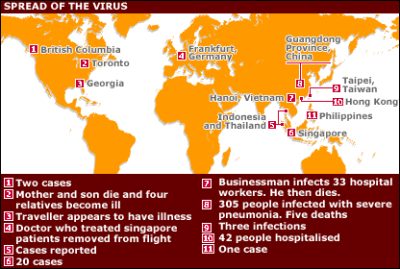UK man may have 'mystery illness' -- Doctors are struggling to contain the virus
Health authorities around the world are struggling to contain a lethal form of pneumonia as air travellers spread it across three continents.

A British man returning from Hong Kong has been admitted to hospital with a "probable case" - the UK's first.
The World Health Organisation (WHO) issued a rare emergency warning over the weekend, declaring the sickness "a worldwide health threat", and saying that cases had been reported on three continents.
The British man is now being treated in the specialist Infectious Diseases Unit at North Manchester General Hospital as a precautionary measure.
He fell ill after travelling from Hong Kong to Manchester via Amsterdam on 15 March.
Passengers on the two flights he took - KL 0888 from Hong Kong to Amsterdam and KL 2037 from Amsterdam to Manchester - have been advised to consult a doctor if they develop respiratory problems.
Dr Lorraine Lighton, the head of Greater Manchester Health Protection Unit, said: "His condition appears to be compatible with severe acute respiratory syndrome, which is the illness we have heard about coming from South East Asia and China.
"This is a flu-like illness which has killed at least nine people so far."
Earlier, England's Chief Medical Officer Professor Sir Liam Donaldson said: "This is something we are viewing very seriously. We are not sure whether the case is linked but we are treating it as a possible link".
So far, there have been four deaths related to the pneumonia - and another five in an outbreak of a similar infection in a province of China, although the two have not yet been definitively linked.
In total nearly 200 people are believed to have been infected world-wide in the last week alone.
If it was influenza, I expect we would have heard this by now. That's certainly rather reassuring
Professor John Oxford, Queen Mary's College London
Q&A: Mystery illness
The Prime Minister of New Zealand, Helen Clark, told a news conference that WHO experts believed it might rival "Spanish flu" in 1918 - which killed at least 20 million and possibly double that number.
However, an expert from the WHO played down those fears. Pascale Brudon said: "Today we don't know enough about the outbreak to be able to say that. I would be less alarmed than that."
Good news
A British expert said it was unlikely the illness is flu - the most frightening scenario for experts. Professor John Oxford, a world-leading figure in virology, based at Queen Mary's College in London said the fact that a culprit had not yet been identified was good news.
"If it was influenza, I expect we would have heard this by now. That's certainly rather reassuring. It doesn't look like a 'zing-dinger'," he said.
"This has been smouldering around the Far East for some time - it's not as if it has just exploded. I wouldn't get too worried about this."
The WHO warned travellers and airport staff to be on the look-out for signs of the condition, known as Severe Acute Respiratory Syndrome.
Its symptoms include high fever and breathing difficulties, and it has an incubation period of two to seven days.
Crossing continents
On Sunday, the WHO said two deaths had been reported in Canada. The two are thought to be a mother and child returning from Hong Kong, where one victim died last week and 83 people have already been taken ill.
Other cases have been reported in Vietnam, where a nurse died on Sunday and at least 40 other medical workers are infected.
In Germany a doctor suspected of having caught the virus whilst in Singapore is currently in quarantine.
There are also reports of suspected cases of the disease in Switzerland, Australia, Slovenia, Taiwan, Thailand, China and the Philippines.
Travel advisory
The illness is thought to be highly contagious
The outbreak is thought to have begun in the Vietnamese capital Hanoi last month, after an American businessman travelling from Shanghai infected hospital workers before himself dying of the disease.
The Vietnamese nurse who died on Sunday is thought to have given him treatment during his time in Hanoi. As many as 40 others in Hanoi are thought to be infected.
David Heyman, the WHO director of communicable diseases, told the BBC progress in isolating the cause of the disease was hampered by ignorance about the illness.
"There is no specific antibiotic or anti-viral drug that we can yet recommend," he said.
China link
The East Asian region is the worst affected by the disease.
As well as the cases reported in Hong Kong and Vietnam, authorities in Taiwan and Singapore have reported cases of the disease.
No figures are available yet from China, but the WHO said the flu-like symptoms of the disease were similar to those of a sickness in the southern province of Guangdong last month which infected 305 people, killing five of them.
"All we can tell you right now is that the disease situation here has been placed well under control," a Chinese government spokeswoman said on Monday.
Japan has sent a team to Vietnam to help investigate the cause of the outbreak.